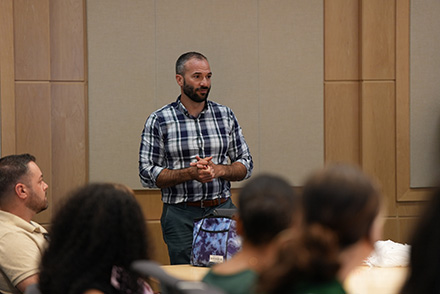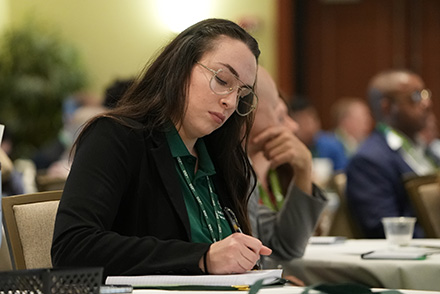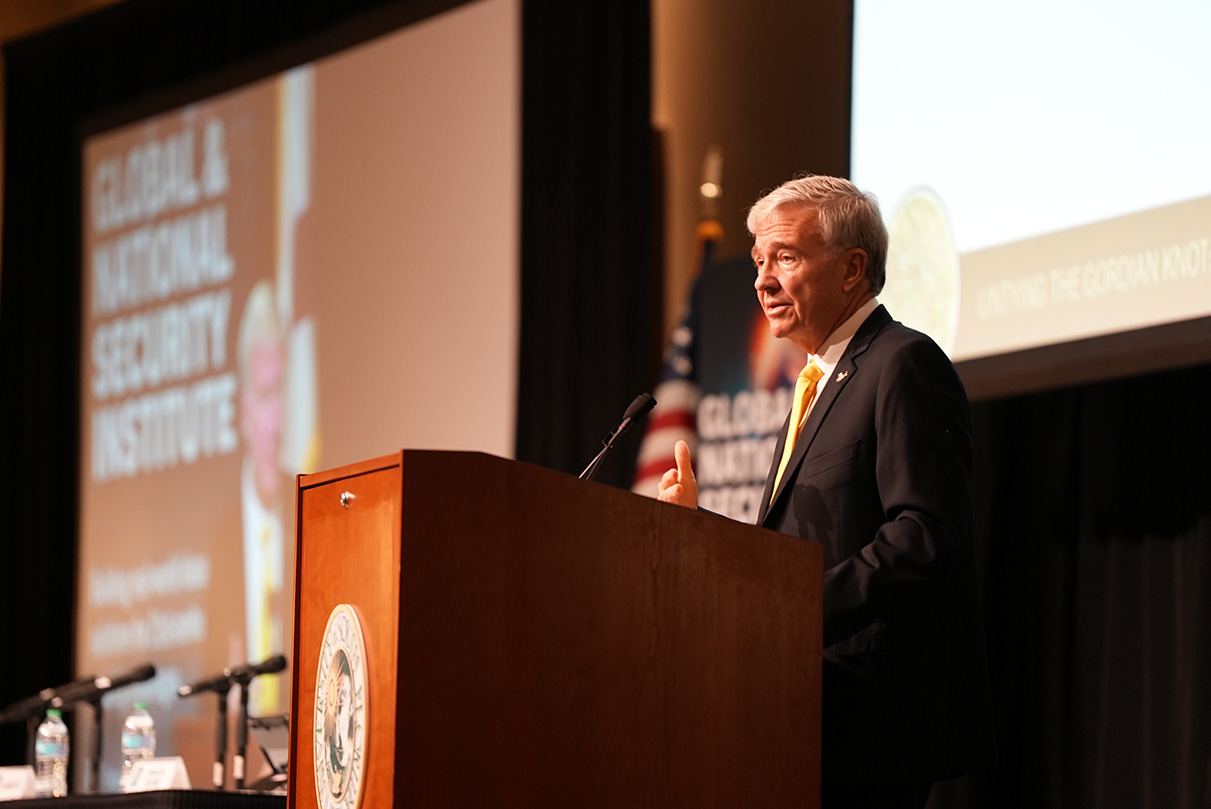By: Cassidy Delamarter, University Communications and Marketing
The University of South Florida is pioneering a program to inspire and prepare students for careers in the global and national security sectors. As part of USF’s Global and National Security Institute, the Future Strategist Program offers hands-on learning experiences to equip students with the practical skills needed to break into the highly competitive and specialized fields of national security.

Rogg talking to the first class students in the Future Strategist Program.
“We all share a lot of the same concerns about what the future of U.S. national security is going to look like, and it's going to depend on the next people and the next generation,” said Jeff Rogg, program coordinator and GNSI senior research fellow. “To our knowledge, this program is unique to USF, and we’re committed to helping students gain the skills and establish the networks they need to excel in national security.”
With students from various academic levels and diverse fields of interest, the goal is to shed light on the variety of pathways that exist in national security. The program will provide students with professional guidance to craft tailored résumés, cover letters and writing samples that meet the specific requirements of national security employers.
Ashley Parow, a USF political science and history honors student, said she's excited about more international opportunities becoming available in Tampa. “I truly feel like this program bridges that gap,” she said. “I believe it offers invaluable opportunities for Tampa students aiming to pursue careers in national security.”

“The rapidly changing global environment and complex twenty-first century issues that we are experiencing inspired me to pursue a career in national security,” said Rachel Stanton, FSP member and global history student. “Being a history major, I hope to bring new insight to these issues one day and work with others from various disciplines towards shared goals.”
The program will also offer mentorship opportunities, pairing students with experienced professionals who can help guide them into their chosen careers, as well as peer mentorship that pairs graduate students with undergraduates. Students will also gain valuable networking through GNSI-hosted events.
In tandem with the program's launch, GNSI hosted its bi-annual conference on the Great Power Competition. The event, in partnership with U.S. Central Command, focused on the complex challenges of achieving long-term peace in the Middle East. Keynote speakers included Maj. Gen. Jasper Jeffers, commander of U.S. Special Operations Command Central, and retired Gen. Frank McKenzie, former commander of U.S. Central Command and executive director of GNSI.
"Bringing together top national security professionals for the 4th Tampa Summit allows us to tackle critical global challenges in real time, but it’s also about shaping the future,” McKenzie said. “By giving students in the GNSI Future Strategist Program access to these thought leaders and opportunities like the summit, we’re not just educating them, we’re empowering the next generation of national security leaders to innovate and lead in a rapidly evolving world."
For Parow, the summit offered a unique opportunity to deepen her understanding of the Middle East and North Africa – a region in which she plans to dedicate her career. With hopes to address refugee crises and their impact on the region’s instability, Parow was particularly excited for the summit’s theme, as it gave her access to exploring her interests in national security there, without needing to leave Tampa.
“What truly motivates me is the belief that refugees deserve dignity and agency. I aspire to contribute to efforts that restore stability and create opportunities for displaced people, recognizing that respect for the region’s rich cultural heritage is key to effective diplomacy and lasting peace,” Parlow said. “It’s amazing to see a summit with such an important focus happening right here on our Tampa campus.”
GNSI is exploring expanding the program with a student organization, which could serve as a model for other universities to adopt and provide similar opportunities to their students.
For students interested in joining, more details are available here. For questions, please email Rogg at jrogg@usf.edu.

McKenzie providing keynote remarks at the GNSI Tampa Summit 4, where leaders gathered to discuss peace in the Middle East.
